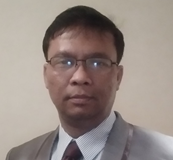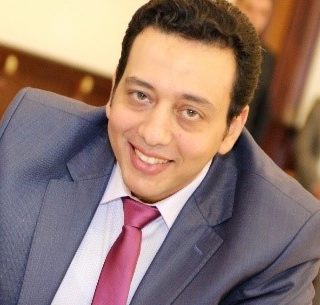From Participant to Facilitator: DHS Fellows from Myanmar and Egypt
The 2020 DHS Fellows Program is currently accepting applications from Bangladesh, Indonesia, Jordan, Maldives, Pakistan, Philippines, Tajikistan, Benin, Burkina Faso, Cameroon, Guinea, Mali, Rwanda, Senegal, and Zambia. Apply to join us for the DHS Fellows Program in 2020. The deadline to apply is November 24, 2019.
In this blog post, we interview two DHS Fellows who served as DHS Program workshop facilitators.
Dr. Kyaw Swa Mya is an Associate Professor and Head of Department of Biostatistics and Medical Demography at the University of Public Health, Yangon, Myanmar and Mr. Ehab Sakr is an assistant lecturer in the department of Demography and Bio-statistics at the Faculty of Graduate Studies for Statistical Research in Cairo University in Egypt. Both Fellows were both co-facilitators for the DHS Fellows Program (2019 and 2018, respectively) in addition to co-facilitating other DHS Program capacity strengthening workshops.
When was your first experience with the DHS Fellows Program?
KSM: In 2018, I was selected as part of a three-member team for the 2018 DHS Fellows Program from the University of Public Health, Yangon. We were the first Fellows from Myanmar where only one DHS survey has been conducted in 2015-2016. In Myanmar, most public health professionals, including myself, were not aware of DHS surveys.
ES: In January 2017, my colleagues and I were selected to be the first Egyptian team to participate in the 2017 DHS Fellows Program. I was eager for this opportunity because I used DHS data in my studies when I specialized in demography 17 years ago.
What was your experience as a DHS Fellows Program participant?
KSM: The Fellows Program provided many opportunities for the participants. First, we learned how DHS data was systematically collected and prepared for data users. Second, the Fellows Program improved our data management and analytical skills using STATA, as well as report writing skills. Third, as a requirement of the Fellows Program, we conducted capacity building activities at our University. These activities raised awareness among the Myanmar government and NGO public health professionals about using DHS data and DHS resources during planning, implementation, and evaluation of their health programs. We also disseminated the findings to stakeholders who impact policy implementation. Finally, we produced a DHS working paper that was published in the PLOS One journal.
ES: The Fellows Program was a great opportunity to enhance my knowledge about survey tools and improve my skills to use DHS data more efficiently and effectively. We were exposed to different cultures and academic trends from five other teams around the world. It’s also worth mentioning that implementing the capacity building project at our home university enriched my technical, teaching, and coaching skills. In two workshops facilitated by Dr. Wenjuan Wang and Dr. Shireen Assaf, we learned to use DHS data tools and techniques when analyzing DHS data. My teammates, Prof. Emeritus Mona Khalifa and Dr. Wafaa Hussein, and I wrote a DHS working paper titled “Changes in Contraceptive Use Dynamics in Egypt: Analysis of the 2008 and 2014 Demographic and Health Surveys.”
What was your experience as a facilitator?
KSM: The DHS Program gave me a second opportunity to participate in the DHS Fellows Program as a co-facilitator. I am thankful to The DHS Program for this opportunity. It was quite a challenging experience to be a co-facilitator. As a Fellow, I only needed to focus on my research topic, but as co-facilitator, I needed to learn all the research topics of participating countries. Moreover, I had to prepare lecture topics and this helped me become more familiar and confident with DHS methodology, analytical skills, and interpretation of the results.
ES: July 2019 was another great moment when I was asked to co-facilitate a workshop in Jordan on producing report tables using SPSS syntax at the Department of Statistics. It was a great experience communicating with lovely and skilled trainees, and we adapted to situations that forced us to customize the agenda of the workshop to suit the skills and knowledge of the trainees.
What impact has the DHS Fellows Program made on you?
KSM: The DHS Fellows Program changed my career, and DHS data has become a core part of my life. Since 2018, I published two journal articles and presented two oral presentations at the 10th and 11th International Conference on Public Health among Greater Mekong Sub-Regional Countries. One of my Masters in Public Health (MPH) students received a degree and I reviewed two master theses of two junior colleagues using DHS data and they achieved their master’s degree from foreign countries. I also received some emails from different countries asking for help with DHS coding and analysis challenges, and I helped them as far as I could. In addition, three of my MPH students prepared their proposals using DHS data this year. Myanmar is now realizing the data quality and accuracy of DHS indicators, so, not only academicians and students but also program managers and policymakers are using DHS indicators in relevant situations.
The DHS Fellow Program is one of the best and most effective programs that I have ever attended. I am grateful to USAID for providing financial and technical support to collect and disseminate quality data to monitor and evaluate population, health, and nutrition programs for developing countries.
ES: The DHS Fellows Program was life-changing and it gave me the opportunity to deepen my scientific and practical knowledge in an international, inspiring, creative, and diversified environment. Special thanks to USAID, The DHS Program team, and all the people I mentioned above. I learned a lot from them and hope to continue collaborating with them in the future.
Photo caption: Facilitators and participants from the 2018 DHS Fellows Data Analysis Workshop. ©ICF
Written by: Kyaw Swa Mya and Ehab Sakr

Dr. Kyaw Swa Mya is a Biostatistician. He is an Associate Professor and Head of the Department of Biostatistics and Medical Demography, University of Public Health, Yangon, Myanmar. He holds a master’s degree in Public Health in Biostatistics. He is a member of the Institutional Review Board of the University of Public Health, Yangon. He currently works as a module supervisor of Diploma in Research Methodology and Research Ethics program conducted in the University of Medicine (I). His research interests are maternal and child health, nutrition, and non-communicable diseases.

Mr. Ehab Sakr is an assistant lecturer in the department of Demography and Bio-statistics, Faculty of Graduate Studies for Statistical Research, Cairo University in Egypt. He holds a master’s degree in Statistics from the Faculty of Economics and Political Science. His thesis theme was related to the levels and trends of age at first marriage for women in Egypt. He taught and consulted on various topics related to population dynamics and development and is currently a Ph.D. student.


Great people! I know both them; ES as my facilitator in 2018 and Kyaw as fellow in 2018 and co-facilitator in 2019. Both are energetic and supportive.
Very big Congratulations, Sayar Kyaw Swar Mya!If I have a chance to participate, I want to learn about DHS.
Big congratulations Dr. Kyaw Swa Mya, our excellent cofacilitator of 2019 DHS Fellows Program.
May I acknowledge again for your kind support for our 1st Workshop in Addis, Ethiopia and 2nd Workshop in Jakarta, Indonesia to publication of not only as DHS Working paper but also as published paper in international Journal.
Big congratulations Dr.Kyaw Swa Mya,our excellent cofacilitator of 2019 Fellows Program.May I acknowledge again for your kind support for 1st Workshop in Addis,Ethiopia, 2bd Workshop in Jakarta,Indonesia and kind advices and suggestions for not only publications of DHS Working Paper but also International publication in IJCMPH.